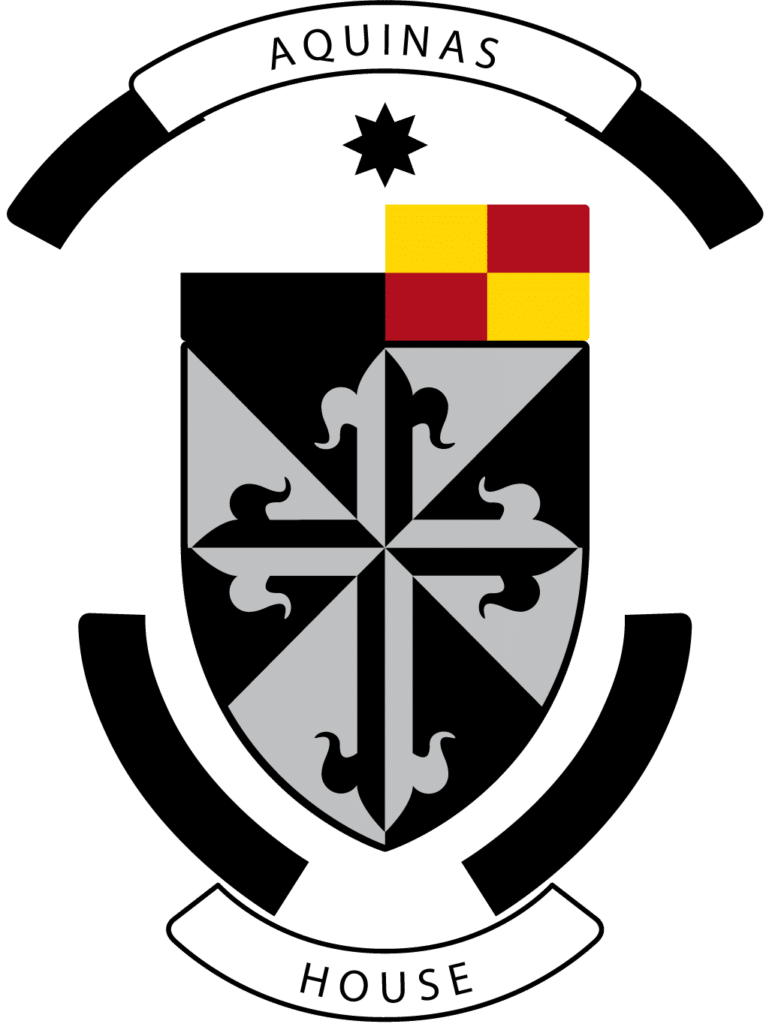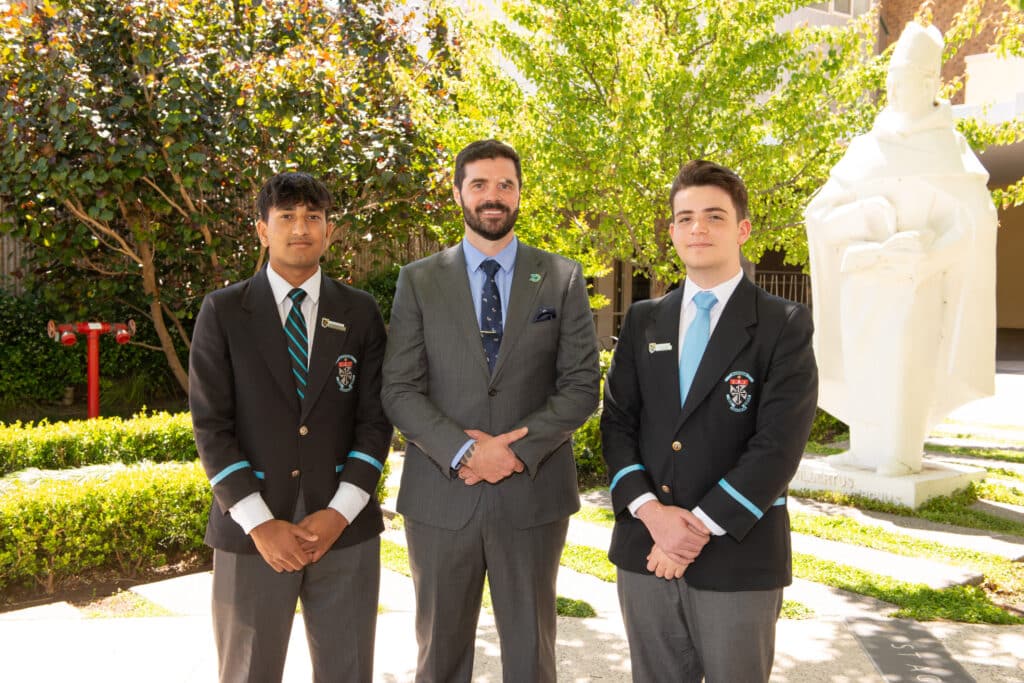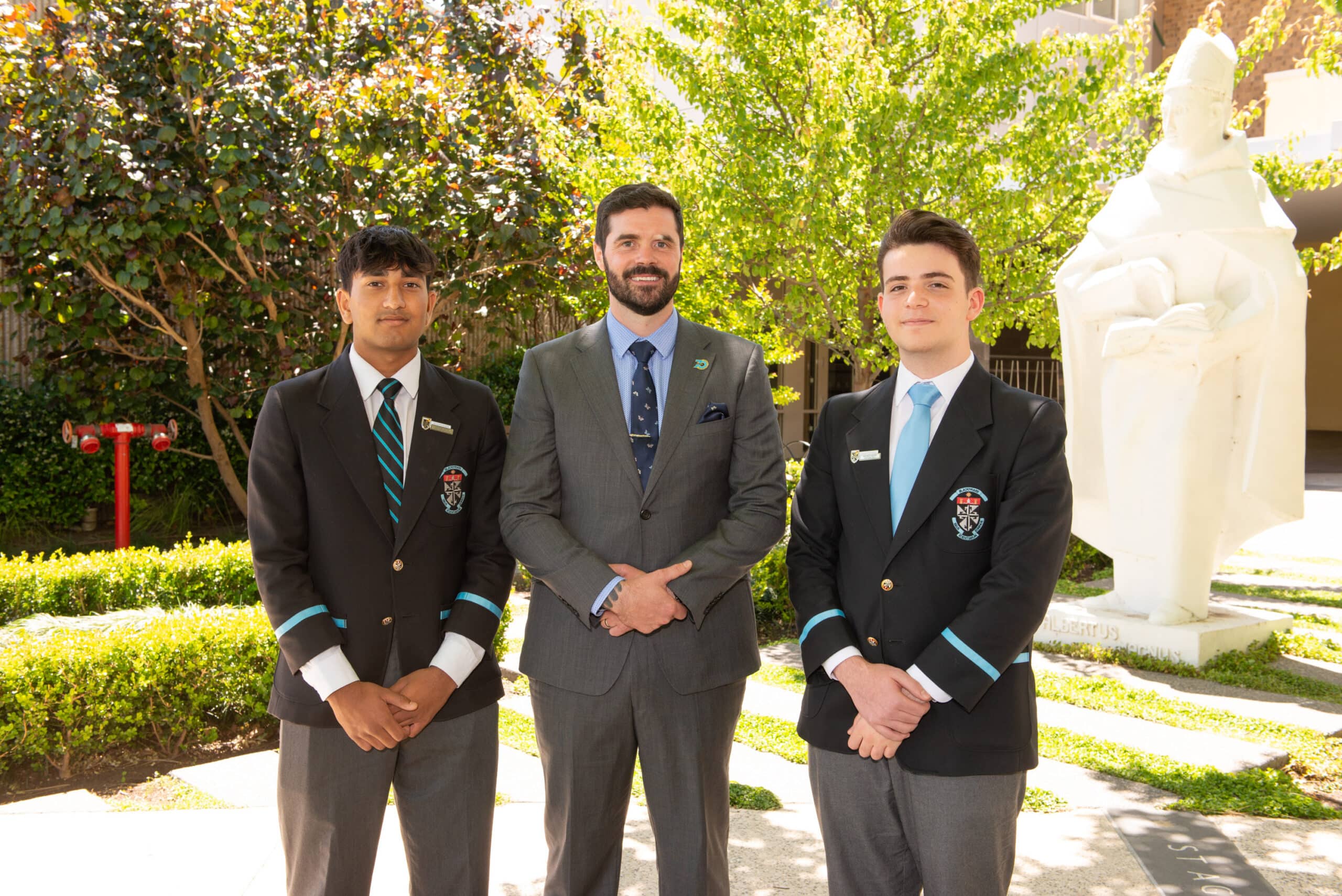
Established: 1986
Colours: White/black
Named for: St Thomas Aquinas (1225-1274)
Flag: Composed of quarters of white and black and eighths of gold and red. The black and white segments signify the Dominican Order and the red and gold, the colours of the Aquino family crest, which features two lions rampant.
Patron: St Thomas Aquinas (Feast Day: 28 January)
2024 House Captain: Mohammed Mohsin
2024 Deputy House Captain: Shaiem Shakeel
2024 Head of House: Beau Leonard

Fr John Neill Athletics Cup (est.1987)
Winner: 1993, 1994, 1995, 2005, 2006, 2009, 2010
Runner-up: 1991, 1992, 1996, 1997, 1998, 2007, 2008, 2014, 2023
Annual Swimming Carnival (est. 1987)
Winner: 1990, 2002, 2003, 2004, 2005, 2007, 2010, 2011, 2012, 2013, 2023
Runner-up: 1998, 1989, 1991, 2008, 2009, 2014, 2022
St Albert Shield for Academic Excellence (est. 1993)
Winner: 1993, 1994, 1995, 1996, 1997, 1998, 1999, 2005
Runner-up: 2000, 2001
House Spirit Shield (est. 2004)
Winner: 2005
Runner-up: 2006
Magnus Medal & Nicholas Altman Prize – School Dux
1988: Leslie Bright (Science/Mathematics)
1992: Tom Snelling (Science/Mathematics)
1997: Benjamin Barona
2007: Khoa ‘Kevin’ Le
2013: Alexander Lai
Jordan of Saxony School Spirit Award
1989: Jack Snelling
1992: Tom Snelling
1993: Sam Bridgwood
1998: Adrian Belperio
1999: Edward Snelling
2003: Nathan Cini
2009: Elijah Kopsaftis
St Martin de Porres Service to the Community Award
1988: Daniel Maung
2000: Stuart Dennis
Frassati Sportsman of the Year Award
1988: Darren Ellul
1988: Anthony Sellan
1990: Paul Rugari
1995: Scott Mathews
1998: Joseph Tassone
2002: David Tassone
2005: Patrick Harmer
2007: Stephen Sloan
2016: Caelen Grooby
2019: Luis Lawrie-Lattanzio
2022: Jack Slaven
1987: Andrew Harris
1988: Michael Hogan
1989: Gerard Maung
1990: Dean Page
1991: Simon Clark
1992: Mohammed Hussein, Tom Snelling (Deputy)
1993: Sam Bridgwood
1994: Glen Varona
1995: Matthew Hope
1996: Michael Luppino, Simon Marafioti (Deputy)
1997: Matthew Belton, Leo Varona (Deputy)
1998: Daniel Roocke, Damien Brown (Deputy)
1999: Rhys Peters, Huy Dinh (Deputy)
2000: David Johnston, Daniel Luppino (Deputy)
2001: Jonathan Cini, Michael Meier (Deputy)
2002: David Tassone
2003: Michael Weldon, Christian Martino (Deputy)
2004: Craig Steiner, Luke McEntee (Deputy)
2005: Matthew Sloan, Patrick Harmer (Deputy)
2006: Matthew Hill, Jonathan Martino (Deputy)
2007: Stephen Sloan, Marc Lee (Deputy)
2008: James Ormandy, Julian Morena (Deputy)
2009: Thomas Weldon, Julian Magliaro (Deputy)
2010: Michael Sloan, Patrick Nash (Deputy)
2011: Jackson Smart
2012: Trent Allwood
2013: Theo Balomenos
2014: James Cosenza
2015: Joseph Monteleone
2016: Harrison Greven
2017: Rude Lin
2018: James Smith, Gianni Romano (Deputy)
2019: Damon Doody, Charlie Dunn (Deputy)
2020: Ryan Ponte, Joseph Snelling (Deputy)
2021: Fabian D’Angelo, Finn Hudson (Deputy)
2022: Jack Slaven, Daniel Marshall (Deputy)
2023: Adrian D’Angelo, Massimo Gazzola (Deputy)
2024: Mohammed Mohsin, Shaiem Shakeel (Deputy)
1987: Peter Bright^, Craig Bartlam, Matthew English, Andrew Harris
1988: Leslie Bright*, Darren Ellul
1989: Jack Snelling
1990: Paul Rugari
1991: Simon Clarke
1992: Tom Snelling
1993: Sam Bridgwood
1994: Glen Varona, Grant Price, Wayne Ellul
1995: Marco D’Agostino, Thomas Zed
1996: Michael Luppino, Binh Co Huynh, Simon Marafioti
1997: Mathew Belton*, Robert Hunjet, Robert Smith, Leo Varona
1998: Damien Brown*, Adrian Belperio, Daniel Roocke, Joseph Tassone
1999: Rhys Peters, Edward Snelling, Huy Dinh
2000: Stuart Dennis
2001: Patrick Varona, Michael Meier, Michael Hunjet, Timothy Roocke, Frank Reno
2002: David Tassone^, Paul Dimitriadis
2003: Michael Weldon^, Thomas McGovern, Dindo Varona, Jozseph Gesti
2005: Patrick Harmer, Andrew McGovern, Matthew Sloan
2006: Billy Kopsaftis^
2007: Steven Magliaro, Stephen Sloan, Garry Ruth
2008: James Ormandy, Timothy Budden
2009: Julian Magliaro^, Zelingxiu Chen, Elijah Kopsaftis, Andrew Nguyen
2010: Paul DeBlasio, Iltaf Jafari
2011: Josef Ebel, Niall Mitchell
2013: Mohammad Reza Danish
2015: Patrick Mori
2016: Lachlan Nash, Gerald Jones, Domenic Monteleone
2017: Tony Hellewell, James Renney, Mark Macapagal
2018: Phi An Trinh
2020: Frank Snelling
2021: Harry Hieu Vu, Joseph Snelling (YCS)
2022: Finn Hudson, Atharv Mani
2024: Benjamin Baker, Matthew Jones
* denotes Head Prefect
^ denotes Deputy Head Prefect

